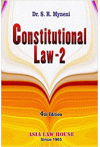- Author(s): Dr. S.R. Myneni
- Publisher: Asia Law House
- Edition: 4 Ed Rp 2023
- ISBN 13 9789392135040
- Approx. Pages 664 + Contents
- Format Paperback
- Approx. Product Size 24 x 16 cms
- Delivery Time 3-5 working days (within Kerala & South India) (Others 7-9 days)
- Shipping Charge Extra (see Shopping Cart)
.........................................................................................................................
Description
Constitution of India has been evolved but not made as a legal document. No advocate in India can be successful in profession without having in depth study of the Constitution of India, the fundamental law of the land. There are a number of standard books on this living subject written by well-known Constitutional experts and stalwarts. But law institutes require student-friendly text-books and few books of such quality are available to students. To fill in the lacuna, the author presents this book on the Law of Constitution in two parts for the use of L.L.B and L.L.M students of India Universities. This text-book has been written based on the syllabi of Bar Council of India and different Universities along with National Law Institutes. No text book writer can claim originality of thought as the prescribed topics have be explained based on the references. The author has referred to the books listed in Bibliography and he expresses his profound gratitude to the eminent authors and publishers of the books referred to. The readers are advised to use this text-book for academic purpose only.
.........................................................................................................................
Contents
Unit - I
Legislatures and Executives of Union and States under the Indian Constitution
Chapter 1. Composition of Union Legislature (Parliament)
Chapter 2. Legislative Procedure in Parliament
Chapter 3. Powers, Functions and Privileges of the Parliament
Chapter 4. Composition of State Legislature
Chapter 5. Legislative Procedure in State Legislature
Chapter 6. Powers, Privileges and Immunities of State
Chapter 7. Anti-Defection Law
Chapter 8. Union Executive the President
Chapter 9. The Vice-President
Chapter 10. The Council of Ministers of the Union
Chapter 11. The Attorney-General for India and Comptroller and Auditor General of India
Chapter 12. State Executive
Unit - II
Judiciary under Constitution
Chapter 1. Appointment of Judges of the Supreme Court of India
Chapter 2. Powers and Jurisdiction of the Supreme Court
Chapter 3. Appointment and Transfer of the Judges of the High Courts in the States
Chapter 4. Powers and Jurisdiction of the High Court
Chapter 5. Subordinate Judiciary
Chapter 6. Independence of Judiciary
Chapter 7. Judicial Accountability
Unit - III
Relations Between The Union and The States
Chapter 1. Legislative Relations Between the Union and the states
Chapter 2. Administrative Relations Between the Union and the States (administrative control of
union over states)
Chapter 3. Financial Relations Between the Union and the States
Chapter 4. Cooperation and Coordination Between0 The Centre and States
Chapter 5. Judicial Interpretation of Centre-State Relations
Chapter 6. Doctrines evolved by judiciary
Unit - IV
Liability Of the State; Services Under the State and other Matters
Chapter 1. Acquiring Property by the Union and the States
Chapter 2. Liability of State in Contracts
Chapter 3. Liability of State in Torts
Chapter 4. Freedom of Inter-State Trade, Commerce and Inter-Course
Chapter 5. Services under the Union and the States
Chapter 6. All India Services
Chapter 7. Public Service Commissions
Chapter 8. Tribunals
Chapter 9. Elections
Chapter 10.Special Provisions Relating to Certain Classes
Chapter 11.Languages
Unit - V
Declaration of Emergency and Amendment Power
Chapter 1. Proclamation of Emergency
Chapter 2. Effects of Emergency on Federalism and Fundamental Rights
Chapter 3. Amendments of Indian Constitution
Chapter 4. Basic Structure Theory
Chapter 5. Union Territories
Chapter 6. Panchayats
Chapter 7. Municipalities
Chapter 8. The Co-operative Societies
Chapter 9. Temporary, Transitional and Special Provisions
Chapter 10. Miscellaneous
Bibliography
Subject Index
.........................................................................................................................
Author Details
Dr. S. R. MYNENI
• Born on 20-8-1939 at Lagadapadu village in Guntur District of Andhra Pradesh to Smt.Annapurnamma
and Sri Butchaiah and hails from a respectable farmers' family.
• He had his Primary School Education at his native village; High School Education (1950-56) at
Pedakurapadu;
Teacher Training (1956-58) at Tadikonda; B.Ed. Training (1965) and B.L. (1990-93) at Rajahmundry (AP).
He has acquired his remaining qualifications from Intermediate (1960) to Ph.D. (1983) and LL.M (1993-95)
from different Indian Universities by private appearance.
• He worked in Government Schools as Primary School Teacher (1958-66), Headmaster and Teacher
Educator Economics as Asstt. Lecturer (1974-77), Lecturer (1977-87), Reader (1987-97) and Mercantile
Law (1998-99) in Government Colleges at Nidadavole Rajahmundry and Kakinada in AP.
• Registered as an Advocate of A.P. Bar Council (1998) and became Member of A.P. High Court Advocates
Association (2001).
• His first book 'International Economic Law' was published in 1996 from then onwards nearly 80 text-
books for B.A., LL.B., and LL.M., Courses written by him were published by Allahabad Law Agency,
Faridabad and Asia Law House, Hyderabad. Some of them are prescribed by some Universities as
textbooks/reference books.
• During the year 2015, under the achievement of writing most law text books, his name has been entered
in, The Limca Book of Records. The Indian Book of Records, The Golden Book of World Records, and The
Unique World Records.
• He visited Moscow (USSR) in 1985 and the USA in 1999.
• He has been associated with Friendship Association and Peace Organization.
• He is the believer of altruism.
.........................................................................................................................

